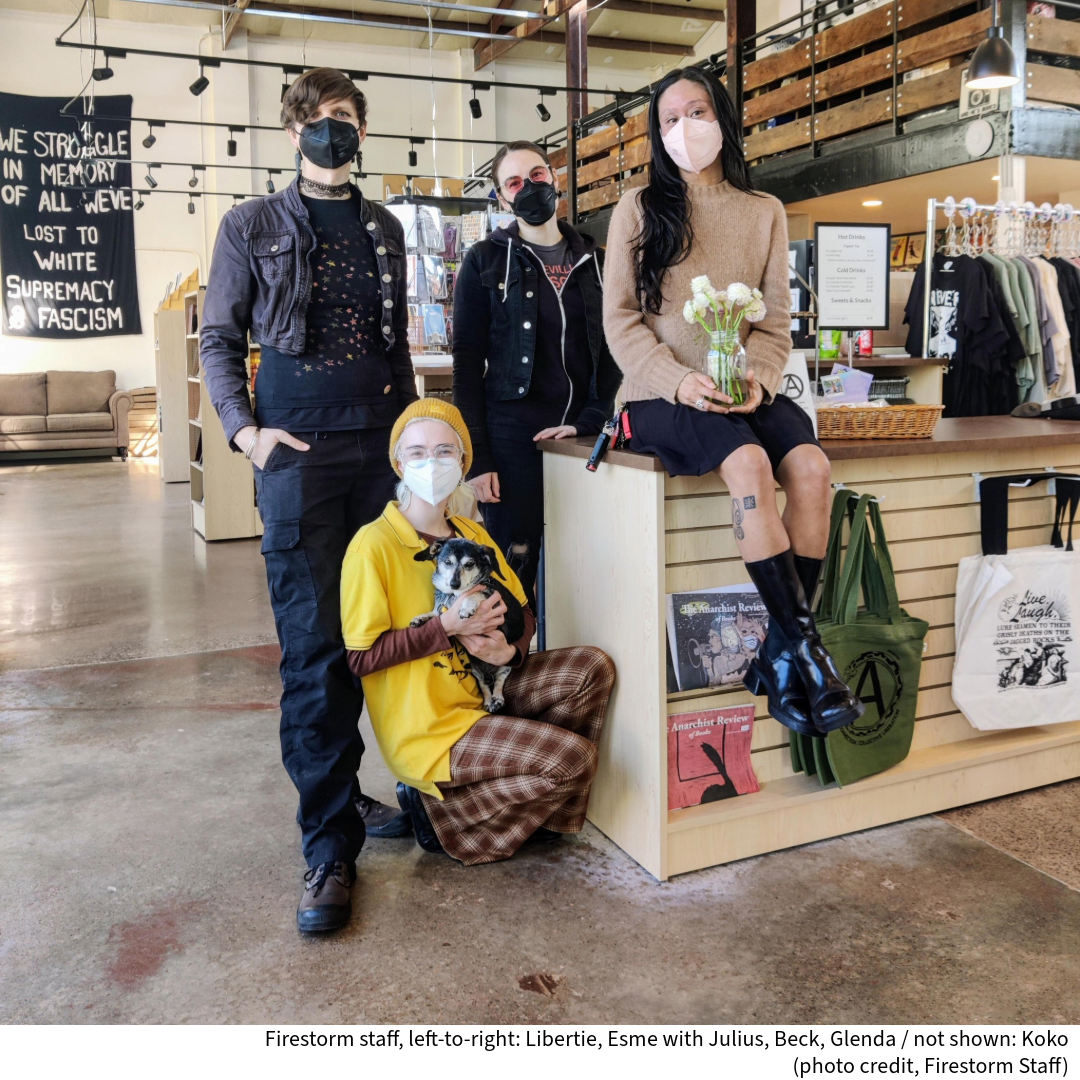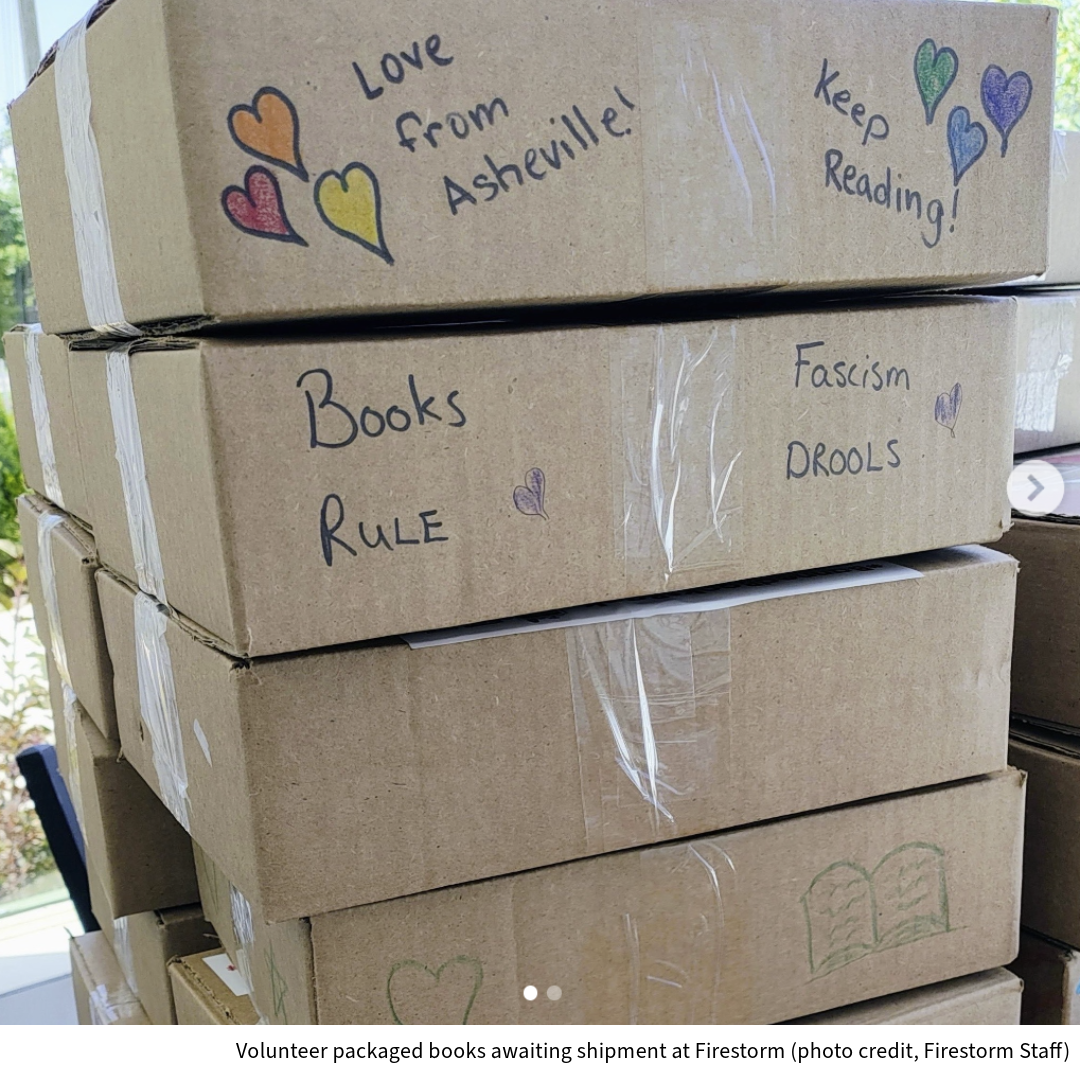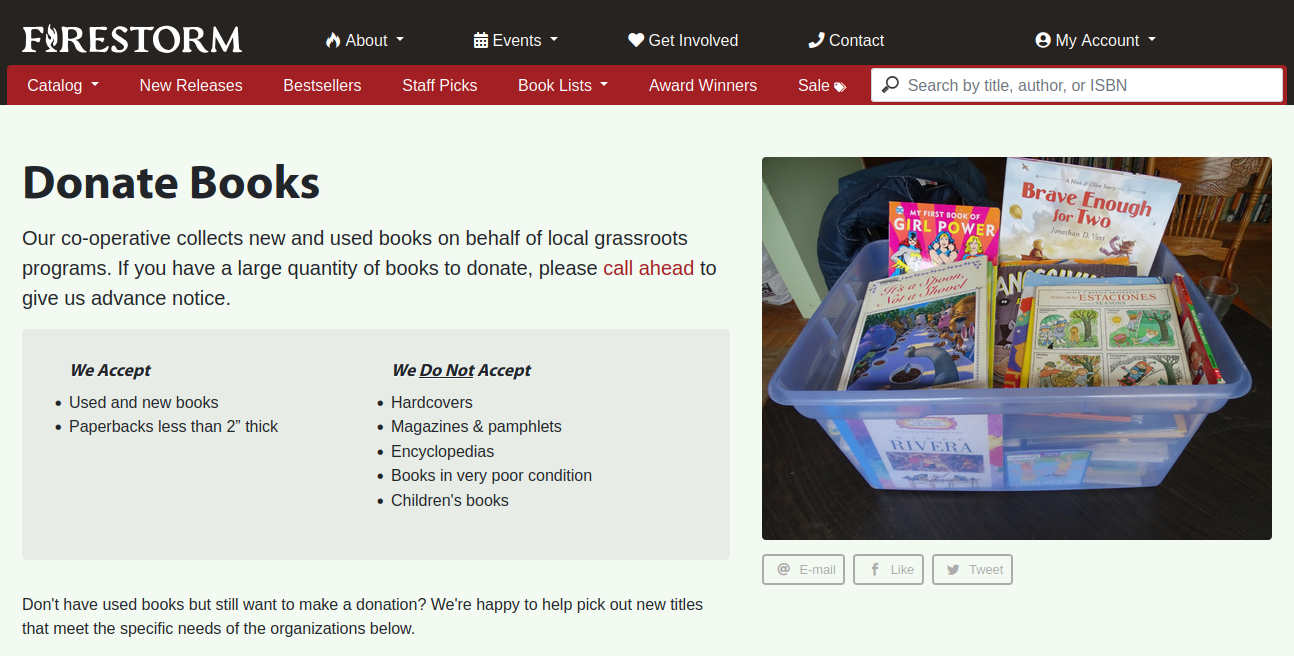by Libertie Valance, Firestorm Books
 Our bookstore is lucky to be in a small city with a long history of grassroots prison book activism. Almost a decade before community activists opened the doors at Firestorm, volunteers launched Asheville Prison Books (APB) to distribute free literature to incarcerated folks across the Southeast. A few years later, Tranzmission Prison Project (TPP) was created to provide books, zines, and other resources for queer and trans prisoners nationwide.
Our bookstore is lucky to be in a small city with a long history of grassroots prison book activism. Almost a decade before community activists opened the doors at Firestorm, volunteers launched Asheville Prison Books (APB) to distribute free literature to incarcerated folks across the Southeast. A few years later, Tranzmission Prison Project (TPP) was created to provide books, zines, and other resources for queer and trans prisoners nationwide.
There has always been overlap between our co-op’s staff and prison book program volunteers. One of our earliest community events was a 2008 benefit for TPP, at which we crowded into the back of a then basement location to watch a pirated copy of a film about a queer and trans volleyball team. It probably didn’t raise much money, but it built community connections, which are the heart of any grassroots effort. A few months later, we began selling APB benefit shirts at a sliding scale of $5-15. In an email proposing the idea, a member of our team noted that the shirts were “really weird styles and sizes” and “smell like Goodwill” (where they’d undoubtedly originated) but featured a skillfully screen printed design.
Over the years, we’ve sold many benefit shirts and hosted a slew of DIY events to raise funds for books and postage—film screenings, puppet acts, waffle brunches, punk shows, and more. We’ve also regularly offered space for volunteer orientations, letter writing activities, and abolitionist teach-ins.
Being volunteer-run organizations, APB and TPP changed over time, waxing and waning as capacity allowed. New members arrived with vision and fresh energy, and older members moved away or shifted focus. The same patterns played out in our co-op during its early years. So while our relationship to the prison book movement continued, it was constantly being reinvented by new configurations of booksellers and volunteers. Many of the things we’re doing, or have experimented with in the past, could be easily replicated by other bookstores…
 Packaging Parties
Packaging Parties
Prison book programs (PBPs) rarely own or rent physical spaces that are sufficient to host public events, so bookstores can offer a free and welcoming place for packaging parties—public events where community volunteers learn the ropes and pack shipments for incarcerated readers. Because prisons and jails impose wildly varied and arbitrary restrictions on mail, these events require the guidance of folks with knowledge of the facilities to which books will be sent. If a local community doesn’t yet include activists who can provide this, bookstores may be able to connect with a regional program that can lend direction and support.
Bookstores can also provide a PBP with a public address for receiving prisoner requests and sending packages. Having a legitimate retailer on the return address increases the likelihood that books are accepted at many facilities, and protects the privacy of individual volunteers.
Book Drives & Wishlists
PBPs aren’t just sending random books into prisons and jails, they’re responding to specific requests from incarcerated folks. Sought after titles—such as contemporary reference works, career development material, and literature by authors with marginalized identities—may be hard for volunteers to come by. But finding books is something that indies are great at!
Booksellers that know what sort of titles are most needed can keep an eye out for damages and ARCs. Book drives, whether short term or ongoing, are another great way for a bookshop to solicit donations that match the needs of incarcerated folks. Many prison book programs will provide clear guidelines for collection.
Nevertheless, some highly sought titles, like legal dictionaries, simply can’t be sourced second hand. Bookstores can work with a PBP to curate a list of these books for customers to purchase on behalf of an incarcerated reader. At Firestorm, we feature frequently requested titles on our website.

Fundraisers, Benefit Merch & Matching Donations
For PBPs, covering postage is often a greater barrier than finding books, and indies are well positioned to help with that too, even if they don’t have cash to spare. Fundraising strategies could include campaigns, like donating a portion of sales during Prison Banned Books Week, and ongoing efforts, like a donation jar to passively solicit funds at the register, or unique “benefit” merchandise. The impact of these efforts can be extended when a bookshop or PBP identify donors willing to match funds.
Even when fundraising events don’t take place at a bookstore, booksellers can still have an impact by donating raffle items and supporting publicity through in-store signage and social network promotion. It turns out that the sort of people who visit your bookstore are also the people most likely to generously support literary activism!
And that brings us to a final opportunity: Advocacy and Awareness. Bookstores have a huge role to play in educating their communities about the censorship and abuses taking place in prisons and jails. By building a relationship with a PBP, bookshops can direct resources, but also passionate people, into the work of addressing these harms while fighting for a better world!